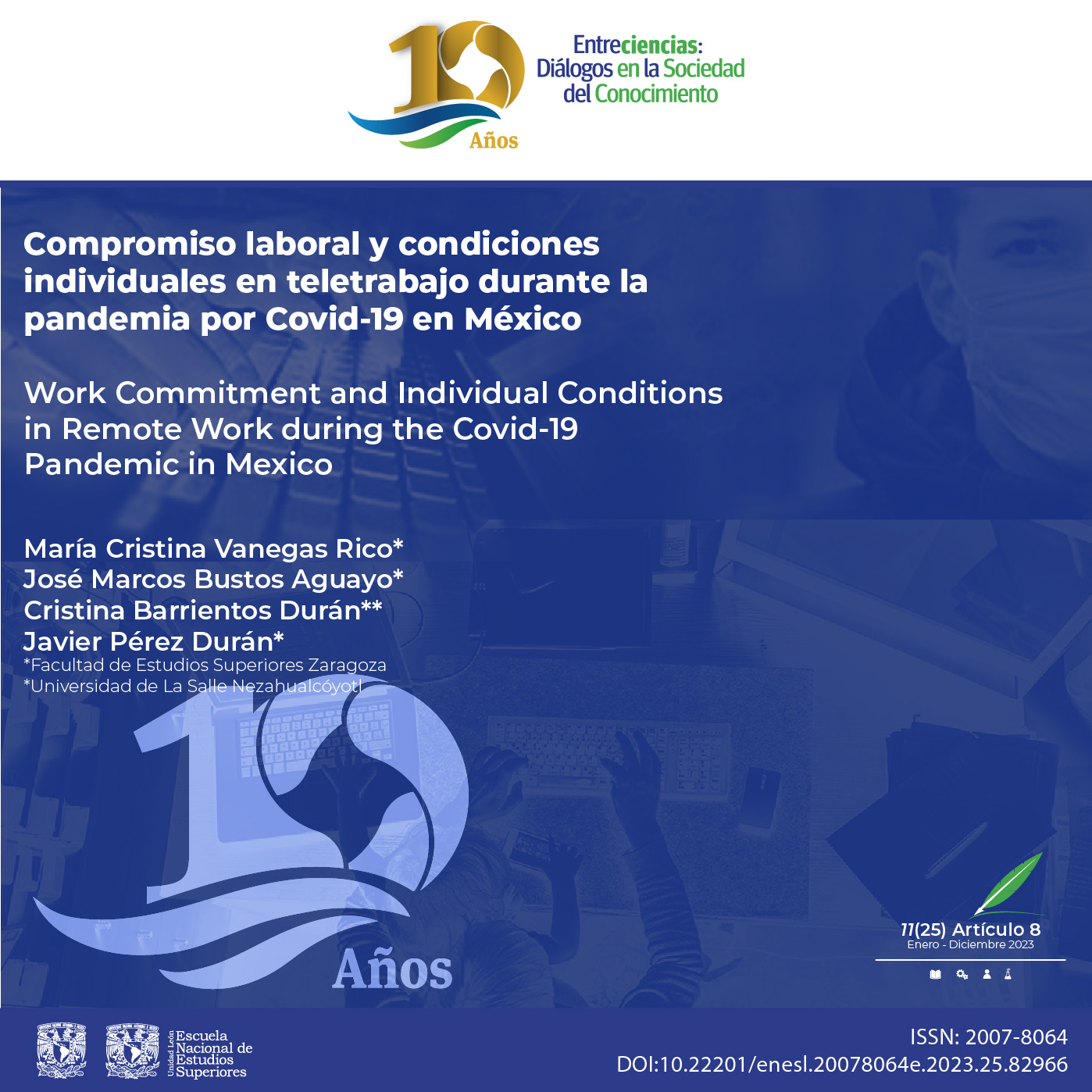Compromiso laboral y condiciones individuales en teletrabajo durante la pandemia por Covid-19 en México
Contenido principal del artículo
Resumen
Objetivo: medir el compromiso laboral en una muestra de trabajadores mexicanos laborando en teletrabajo debido al confinamiento por el virus SARS-COV-2, para observar si el capital psicológico, así como recursos para trabajar desde casa, pueden tener una influencia en el grado de compromiso que presentan.
Diseño metodológico: se utilizó un diseño no experimental transversal, al aplicar un conjunto de escalas a una muestra -no probabilística- de 404 trabajadores (57.2% mujeres, 42.8% hombres; con edad promedio de 35.82 años). Se evaluó el compromiso laboral con la versión breve de la UWES, traducida y adaptada por Villa et al. (2019); el capital psicológico con la escala PCQ-12, traducida y adaptada por Santana-Cárdenas et al. (2018), y se creó una lista de recursos para trabajar desde casa.
Resultados: se propuso un modelo de ecuaciones estructurales que presentó un efecto de mediación del capital psicológico entre los recursos y el compromiso laboral, además, se observó que el grado de compromiso que mostraron los trabajadores no pareció diferente a lo que se reportaba en estudios prepandemia.
Limitaciones de la investigación: el modelo de medición no concordó con la estructura original de las escalas, por ello se sugieren más estudios sobre la pertinencia de su uso.
Hallazgos: los resultados resaltan la importancia de la adecuada adaptación para trabajar desde casa que impulsa el capital psicológico de los trabajadores y ayuda en el mantenimiento de su compromiso laboral.
Descargas
Detalles del artículo
Citas en Dimensions Service

Esta obra está bajo una licencia internacional Creative Commons Atribución-NoComercial-SinDerivadas 4.0.
Entreciencias: Diálogos en la Sociedad del Conocimiento reconoce y respeta el derecho moral de los autores, así como la titularidad del derecho patrimonial, transferida de forma no exclusiva a la revista para su difusión en acceso abierto y su preservación, por lo que los autores que publiquen en esta revista aceptan las siguientes condiciones:
- Entreciencias: Diálogos en la Sociedad del Conocimiento por Universidad Nacional Autónoma de México se distribuye bajo una Licencia Creative Commons Atribución-NoComercial-SinDerivar 4.0 Internacional, la cual permite utilizar la información y los metadatos sin fines comerciales siempre y cuando se realice la citación correspondiente.
- Los autores tendrán el derecho de realizar la distribución no exclusiva de la contribución publicada en Entreciencias: Diálogos en la Sociedad del Conocimiento, es decir, podrán incluirlo en un repositorio institucional o darlo a conocer en otros medios digitales o impresos, siempre y cuando se indique que el artículo fue publicado por primera vez en Entreciencias: Diálogos en la Sociedad del Conocimiento, y además se incluyan datos como: autor de correspondencia, año, volumen, número de páginas, paginación electrónica y DOI.
- Los autores cuyas contribuciones sean aceptadas para su publicación deberán enviar la Carta de Cesión de Derechos en el formato llenado y firmado según corresponda, es decir, de un autor, o de dos o más autores.





